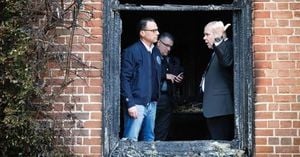One of Europe’s most wanted fugitives, Jos Leijdekkers, has been living openly in Sierra Leone for about six months according to Dutch authorities. The 33-year-old former crime boss was sentenced to 24 years in prison by a Rotterdam court last year for smuggling more than seven tonnes of cocaine. Dubbed "Bolle Jos," Leijdekkers has emerged as one of the Netherlands’ most notorious criminals, previously linked to the infamous Mocro Mafia.
The urgency surrounding his capture has reached fever pitch. Dutch prosecutor Wim de Bruin stated, "We are doing everything we can... but we cannot comment any farther because of the continuing investigation." His return to the Netherlands remains the highest priority for Dutch law enforcement. This reflects the serious concerns about his criminal enterprises which reportedly extend beyond those seven tonnes of cocaine.
Leijdekkers was initially believed to be residing in Turkey before reliable intelligence confirmed his presence in Sierra Leone. This came to light significantly after he was spotted at the New Year’s Day church service, held at St. Joseph’s Catholic Church, located in the President's hometown of Tihun. Videos circulating on social media appear to show him sitting just behind Sierra Leone’s President Julius Maada Bio and next to what is reported to be the President’s daughter.
Dutch police officers have described Leijdekkers as "one of the key players" in international cocaine trafficking. They have indicated concerns about his long-running operations, generating millions through trafficking via the ports of Rotterdam and Antwerp.
Authorities have offered a staggering $210,000 reward for information leading to his capture, reportedly the highest amount ever for a Dutch fugitive. Despite this, Leijdekkers remains difficult to apprehend. The lack of extradition treaties between Sierra Leone and the Netherlands opens the door for him to exploit legal loopholes, especially if he has acquired Sierra Leonean citizenship.
The ramifications of Leijdekkers' connections to high-profile officials within Sierra Leone’s government raise eyebrows. There are allegations circulating about his potential marriage to Agnes Bio, the President’s daughter, which would afford him significant safety and protection from prosecution.
On the broader stage, Sierra Leone is known to play a pivotal role as one of West Africa's gateways for cocaine transported from South America to Europe. The country may be considered among the ten least developed overall, but its location on drug trafficking routes has made it strategically important.
The authority’s connection to Leijdekkers adds another layer of complexity. Early this year, Sierra Leone had already faced its issues with drug trafficking when seven suitcases filled with what were believed to be cocaine were discovered connected to its embassy personnel. This incident led to the urgent recall of Sierra Leone’s ambassador to Guinea.
With West Africa increasingly identified as a significant transit area for illicit drugs, international law enforcement agencies have begun tightening their focus on the region. The authorities have raised alarms about the increasing volume of cocaine smuggled through ports located along the West African coast.
Nonetheless, the investigative efforts to bring Leijdekkers before Dutch authorities face serious hurdles. There are claims from some reports indicating intercepted communications suggest he may have laundered millions of euros earned from the cocaine trade, which undoubtedly extends the reach and impact of his criminal activities.
Leijdekkers's notoriety has only escalated, not just because of the volume of drugs he has trafficked but also due to his alleged involvement with organized crime at the most severe levels. His prior connection to Naima Jillal, known as the "Godmother of Cocaine," who vanished under suspicious circumstances, suggests he may have been tied to her fate.
While Dutch authorities rush to secure justice for the crimes committed, Leijdekkers remains at large, protected by complex social ties and international judicial complications. The stakes couldn't be higher as they navigate through accusations of high-level corruption and longstanding criminal networks. Leijdekkers’ next moves will be closely monitored as both nations grapple with the intense scrutiny and the inevitable questions around accountability and justice.



